Quinn Hughes is having quite the rookie season for the Vancouver Canucks. He just hit the 50 point plateau and is on pace for 64, which would shatter Doug Lidster’s record of 63, which he set back in the 1986-87 season, nearly 33 years ago. That’s not just a rookie record, that’s an all-time record for a Canucks defenceman. Not too shabby for a player that hasn’t even hit his 21st birthday yet. No wonder he’s now leading the pack when it comes to discussing who could win the Calder Trophy as the top rookie in the National Hockey League.
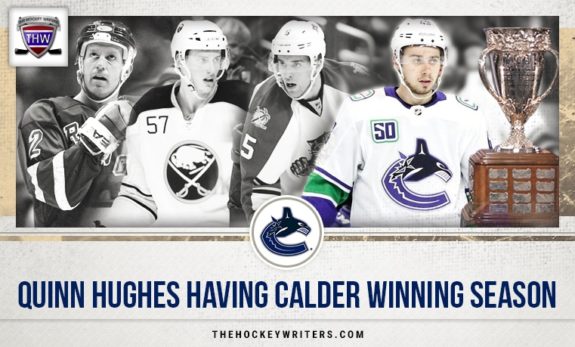
In the history of the NHL, there have been 11 defencemen to win the coveted Calder Trophy. That’s not a lot, considering there have been 82 winners all-time. It’s a very difficult award to win, especially if you’re a defenceman, and Hughes has a very good chance at doing just that. So, let’s get into the time machine and take a look back at how he stacks up with that exclusive club. I bet you will be surprised at who he has already surpassed and who he could pass by the end of the season.
Kent Douglas – Toronto Maple Leafs (1962-63, 22 Pts)
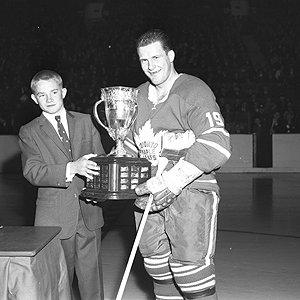
Kent Douglas of the Toronto Maple Leafs was the first defenceman ever to walk away with the trophy at the ripe age of 26, and he did it with only 22 points. As you could probably guess, that season was not a huge one for rookies. In fact, there were no forwards up for the award. Doug Barkley of the Detroit Red Wings, Wayne Hillman of the Chicago Blackhawks and Jim Neilson of the New York Rangers were all defencemen and Eddie Johnston of the Boston Bruins was a goaltender.
Douglas had the most goals of all the candidates with seven and was a plus-18 for the best team in the NHL. He not only won the Calder, but he also won the Stanley Cup. Hughes can only hope the Canucks can be that lucky.
Obviously, Hughes is having a better rookie season than Douglas. It took him only 29 games to get to the 22-point mark and he already has more goals than him with eight so far.
Douglas played seven more seasons in the NHL, putting up 33 goals and 148 points in 428 games. He had a relatively successful career, but I bet Hughes will probably have an even better one.
Jacques Laperriere – Montreal Canadiens (1963-64, 30 Pts)
The next season saw another defenceman win the award in the form of Jacques Laperriere of the Montreal Canadiens. He competed with two other defencemen in Terry Harper, who was actually his teammate with the Canadiens and Bob McCord of the Boston Bruins. Fun fact, the voting was dominated by only two teams that season with John Ferguson of the Canadiens and Gary Dornhoefer of the Bruins joining the party as well.
Like Douglas, Laperriere won it with a relatively low total of 30 points. It was somewhat surprising, as Ferguson was the leading point-getter with 45. But Laperriere ultimately won it with a staggering 117 votes, 53 of them for first place. By the end of his 12-year career, he had won five Stanley Cups, a Norris Trophy and accumulated 282 points. He also went on to become an assistant coach with the Canadiens for a staggering 15 seasons and was eventually inducted into the Hall of Fame.
Again, Hughes has already eclipsed Laperriere’s goal and point totals. Though, it’s difficult to compare them since they are such different defencemen. Hughes is a smooth-skating, offensive defenceman with a very high hockey IQ, while Laperriere was a sturdy, hard-nosed blueliner with a penchant for physical play. He racked up 679 penalty minutes (PIM) in his career while Hughes only has 20 PIMs so far, and he will probably not even get to the century mark in his career, let alone close to 700.
Bobby Orr – Boston Bruins (1966-67, 41 Pts)
Now we start getting to some of the greatest defencemen of all-time to win the Calder Trophy. One of them being the great Bobby Orr. Before you ask, no, I am not saying that Hughes is a generational talent like Orr, even though he has already passed the point total he recorded in his rookie season. For one, he is playing his first at age 20, while Orr played his at age 18. By the time he was 20, he had put up a 64-point season before recording an insane six straight 100+ point campaigns. In fact, he eclipsed the 120- point plateau in four of those.
Related: Bobby Orr’s Landmark Season
Orr was not just a phenomenal playmaker, he was also a lethal goal scorer. By the end of his career, he had recorded five 30-goal seasons and even one 46-goal campaign. Those are totals that forwards dream of, and he was a defenceman. No one has touched his 139 points in 49 years, and I wager that no one ever will. The closest anyone got was Paul Coffey in the 1985-86 season when he had 138 points. In the modern era, only Brent Burns of the San Jose Sharks was even remotely close with 83 points.
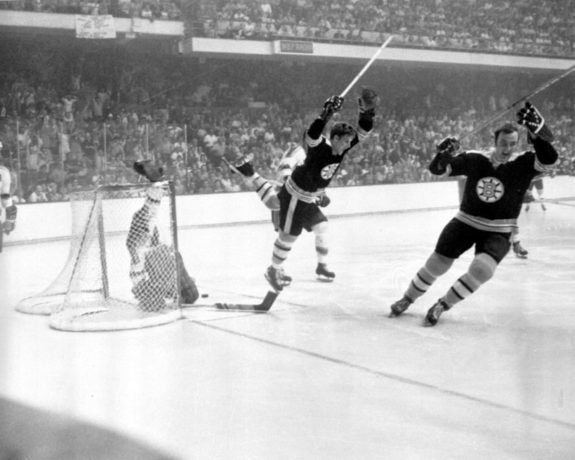
Hughes definitely has the potential to do what Burns did, but he will have to add a little more goal scoring to his repertoire. We all know he will get plenty of assists, but if he can somehow pot a few more goals, the sky’s the limit for the man they call Huggy Bear. Unfortunately, he will never become the defenceman Orr was, he was one in a million. Though he can always say that he put up more points in his rookie season than he did.
Denis Potvin – New York Islanders (1973-74, 54 Pts)
Denis Potvin was another generational talent to hit this list. At the time, his 54 points were the best a rookie blueliner had put up in the history of the NHL (since eclipsed by Brian Leetch in 1988-89). He also led the Islanders in scoring, which is a difficult thing to do as a member of the defence core.
Related: Islanders’ Denis Potvin: Overlooked Greatness
Like Orr, Potvin was a goal scorer as well as a premier playmaker. Unlike him, though, he was also a frequent occupant of the sin bin. He displayed that attribute almost immediately when he put up 175 PIMs to go along with the 54 points. He continued that throughout his career passing the century mark five more times. He was a unique blend of elite offensive skill and toughness that is rarely seen in the modern era. To this day, he is one of the only defencemen to pass 1,000 in both points and penalty minutes.
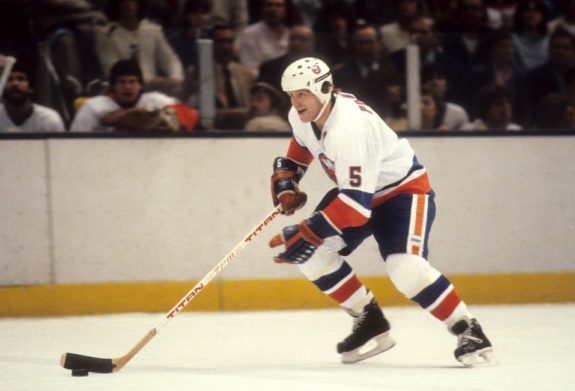
Hughes is a fantastic offensive defenceman, but the comparisons end there when you discuss him and Potvin. He will probably pass the 54 points he put up, but their playing styles are totally different. Hughes has the playmaking abilities and tremendous first pass, but he lacks a physical game. He also is 5-foot-10, 175 pounds compared to Potvin at 6-feet, 205 pounds. That is a lot more beef to work with, and boy, did he use it.
Ray Bourque – Boston Bruins (1979-80, 65 Pts)
We continue our journey through the grove of generational defencemen with Ray Bourque. Bruins’ fans should count themselves lucky to have been able to watch not one but two Hall of Fame defencemen patrol their team’s blue line. Orr and Bourque were two of the most accomplished blueliners in NHL history and they both played most of their career in the black and gold.
Related: Ray Bourque – A Long Way to the Stanley Cup
At 19-years-old, Bourque put together one of the best seasons a rookie blueliner could have with 65 points. 17 of those points were goals as well. Like Potvin and Laperriere, he was not afraid of the physical side of the game, putting up 73 PIMs. By the time he retired, he had also eclipsed 1,000 in both points and penalty minutes.
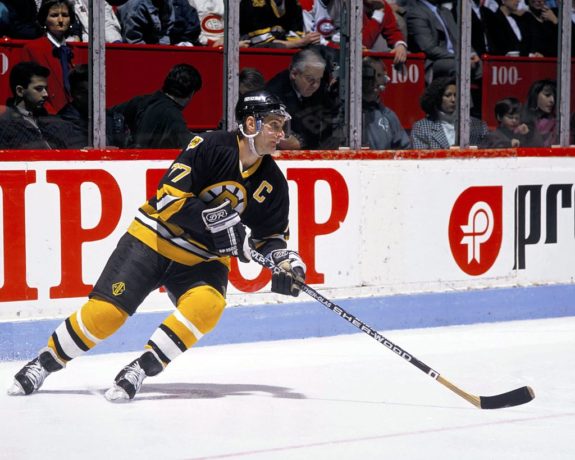
Bourque’s 65 points stood up as the best until the next two defenders on this list broke it wide open with 68 and 71 points respectively.
Gary Suter – Calgary Flames (1985-86, 68 Pts)
The next two defenders on this list will be difficult for Hughes to catch. Gary Suter of the Calgary Flames and Brian Leetch of the New York Rangers were two of the best and both had monstrous rookie seasons in the NHL. After putting up an eye-catching 51 points for the University of Wisconsin, Suter was selected in a round that doesn’t even exist anymore.
Widely known as the biggest steal in NHL history, Suter was drafted 180th overall in 1984 by the Flames. He’s actually the only one on this list who was drafted outside of the first round, and he put up the second-best point total for a rookie in the history of the league. That’s a pretty impressive feat.
Continuing our theme of tough, offensive defencemen, Suter was also not afraid of the physical side of the game. Along with Potvin and Laperriere, he is also a member of the 1,000 points/penalty minutes club. That reputation got him into trouble sometimes though, chronicled by hits that caused injuries to Paul Kariya, Wayne Gretzky, and Andrei Lomakin.
Brian Leetch – New York Rangers (1988-89, 71 Pts)
Now we get to the big man on campus, Brian Leetch. His 71-point season is still the best a rookie defenceman has ever put up in the NHL. Hughes will be hard-pressed to do what he did unless he goes on a serious point-binge in the final 17 games of the season.
Like Hughes, Leetch was a prolific skater and passer of the puck. When you read about him, you could swear they were describing Hughes.
He was a different type of puck-moving defenseman…He didn’t race up ice like Paul Coffey or Bobby Orr. It never became all about Leetch where you wondered if he would go coast-to-coast and score, although he did do that at times. But once he got the puck the other team was in trouble. We were going to for sure get it out of our zone, and most likely we were going to end up with a scoring chance, even if he started in our zone.
Former Rangers general manager Neil Smith
Hughes also has the ability to move the puck out of his own zone with ease, and create a scoring chance at the same time. The only thing he has to get better at is scoring goals. Leetch hit the double-digit mark 13 times and was a 20-goal scorer five times in his career. Other than that and the fact that he is three inches shorter, Hughes is very similar to Leetch. Now all he has to do is have a career that includes over 1,000 points, two Norris Trophies, a Conn Smythe Trophy and a Stanley Cup. That’s something that could happen, right?
Related: Brian Leetch: The Road to the 1994 Conn Smythe Trophy
Bryan Berard – New York Islanders (1996-97, 48 Pts)
As we inch closer and closer to the modern era, let’s take a look at Bryan Berard. Like most of the defencemen on this list, Hughes has already rocketed past his point total. In fact, he has only four players ahead of him right now, but let’s get back to Berard for a second.
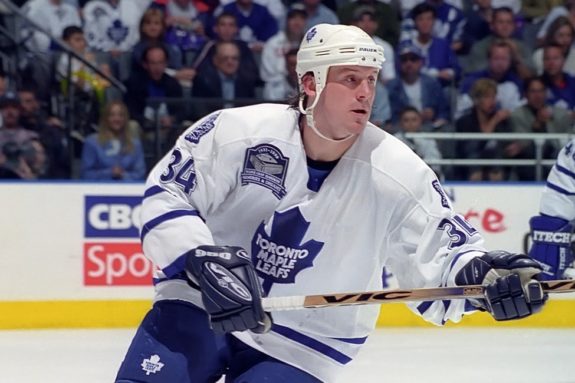
Despite being drafted first overall by the Ottawa Senators in 1995, he never played a single game for them. Nearly six months after being selected, he was traded with Don Beaupre and Martin Straka to the New York Islanders for Wade Redden and Damian Rhodes.
The Senators got a quality defenceman in Redden who put up 101 goals and 410 points in 838 games with the franchise, so I guess the trade worked out quite well for both sides. Berard didn’t have the same success with the Islanders, though he did put up a decent 131 points in 242 games with the team before getting traded again, this time to the Toronto Maple Leafs. By the end of his relatively short career in 2007-08 at the young age of 30, he had 323 points in 619 games. If not for a couple of major injuries, he could have had an even better career.
Related: Bryan Berard Trade Revisited
Barret Jackman – St. Louis Blues (2002-03, 19 Pts)
The 2002-03 season was an interesting season with the voting for the Calder Trophy. Barret Jackman, a defenceman for the St. Louis Blues, ended up winning it despite having rookies like Henrik Zetterberg and Rick Nash on the ballot. Both of them recorded better seasons than him with 44 and 39 points respectively, but the voting favoured the hard-nosed blueliner 39 first-place votes to 14.
Jackman turned in a very solid season for the Blues, playing 20 minutes-a- night, along with an impressive plus/minus rating of plus-23. But he did not produce a lot offensively with only three goals and 19 points. Historically the trophy has gone to the player with the most production, but something must have really impressed the voters about Jackman since he almost ran away with the award. His overall defensive game was probably the biggest factor, as that is traditionally the most difficult to grasp for first-year defenders.
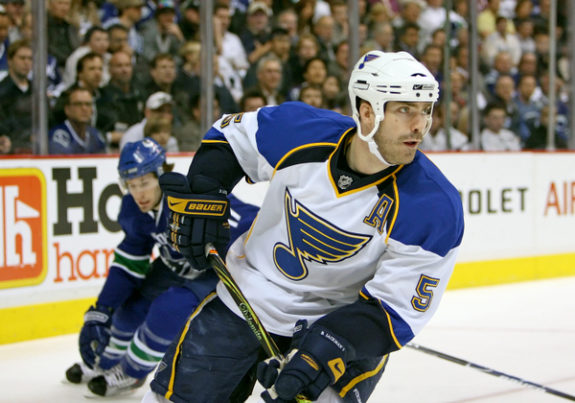
Regardless, Jackman is still one of the most surprising players to ever win the award, even more so when you factor in that he beat out a future Hall of Famer in Zetterberg. He ended up having a solid NHL career with 876 games and 186 points to his credit, but that pales in comparison to Zetterberg’s 1082 games and 960 points. In hindsight, he really should have walked away with the trophy.
Jackman’s season does not compare at all with Hughes’ as he passed the 19-point mark very early in 2019-20. His defensive game is still a work in progress, but he’s learning every game and adjustments have already been made. In time, he will be a perennial plus-player and future candidate for the Norris Trophy.
Tyler Myers – Buffalo Sabres (2009-10, 48 Pts)
After six straight seasons of forwards or goaltenders winning the award, including superstars like Alex Ovechkin, Evgeni Malkin, and Patrick Kane, it was time for another defenceman to win it. This time in the form of 6-foot-8 giant, Tyler Myers from the Buffalo Sabres. Now a teammate of Hughes, he recorded the most points for a rookie defender since Berard in 1996-97, nearly nine seasons prior. His 48 points paced Sabres’ defenders by a wide margin as Steve Montador’s 23 points were a very distant second.
Myers continued the dominance he showed in the Western Hockey League with the Kelowna Rockets when he had 42 points in the regular season and 20 points in the playoffs. His mobility and big shot translated very well to the NHL, as he quickly became the nucleus of the Sabres’ defence core. He was a workhorse too, playing almost 25 minutes-a-night in all situations.
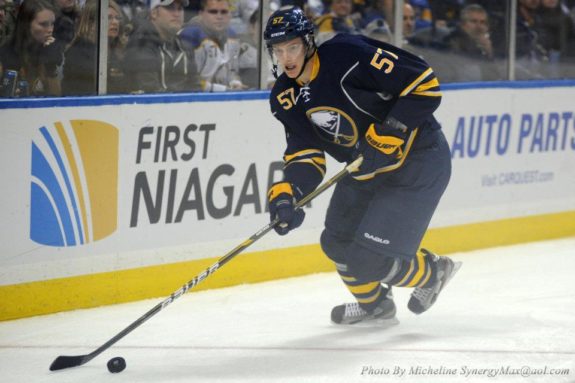
Myers has not been able to match the production and dominant play he displayed in his first season, but he has turned into a fairly dependable defender in the NHL. His defensive game can be lacking at times, but his long reach and mobility are assets more often than not. He may not have become the player Sabres’ fans were envisioning after his rookie season, but he still can be a valuable piece on a team’s blue line.
Now part of the Canucks and frequent partner of Hughes, he has been both solid and head-scratching, sometimes in the same shift. Despite this, he still has produced 21 points and is consistently one of the top minute munchers on the team. He probably won’t ever put up 48 points in his career again, but he still can be a mentor for the 20-year-old Hughes.
Aaron Ekblad – Florida Panthers (2014-15, 39 Pts)
Finally, we get to the most recent defender to win the trophy, Aaron Ekblad. Drafted first overall by the Florida Panthers in 2014, he burst onto the scene as an 18-year-old and quickly became a key part of the defence core. He led all defenders with 12 goals and 39 points and was solid in his own zone with an impressive plus/minus rating of plus-13. He was also second only to Brian Campbell in average ice-time, despite being 18-years-old.
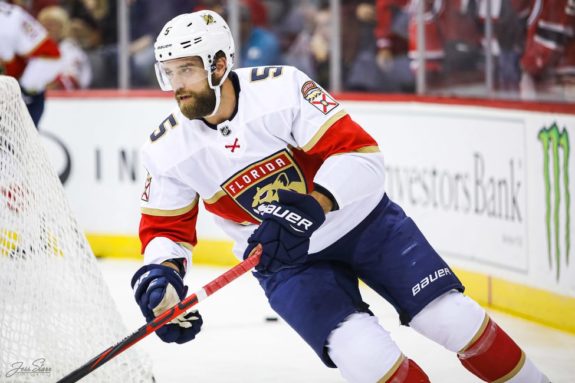
Ekblad looked like a veteran in his first go-around at the NHL level, rarely looking like a player who just graduated from the Ontario Hockey League. He hasn’t been a flash in the pan either, averaging over 30 points a season since his debut. He has also kept up his defensive game, despite being on teams that have struggled to keep their heads above water. Surprisingly, he only has one minus-season on his ledger while averaging 22:30 of ice-time. His underlying numbers have been good as well, with a solid 51.3 career Corsi-for percentage (CF%).
Hughes already has passed Ekblad in points, but he’s doing it at 20-years-old compared to Ekblad at 18. Accomplishing anything in the NHL at 18-years-old is impressive, but being a dominant defenceman at that age is truly remarkable. Nothing against Hughes, but I think Ekblad’s season was more impressive, considering he did it at such a young age.
Having said that, Ekblad has never produced a campaign with 50 points, even though he’s been in the league for nearly six seasons. He is definitely an offensive defenceman, but Hughes will be a consistent 50-plus point player in the NHL, heck, he may even flirt with 70 points in his prime. I don’t think Ekblad will ever see those kinds of numbers in his career.
Hughes Could Actually Win the Calder Trophy
Now that we’ve explored the 11 defencemen that have won the Calder Trophy, you can clearly see why Hughes has a very real chance at winning it. He’s on pace to shatter multiple Canucks’ rookie records, and he’s already passed multiple players that have won the trophy before. If that’s not worthy of it, I don’t know what is.
Currently, Hughes is four points up on Cale Makar of the Colorado Avalanche, who has been his closest rival all season long. It’s not a foregone conclusion that he will win it, but if he keeps up this pace, voters will have a hard time not picking him in the first-place position.
Related: Canucks’ Hughes and the Calder Race
If they need some convincing, all they need to do is look to how valuable Hughes has been to the Canucks. He’s second only to Alex Edler in average ice-time, he leads all defenders in goals and points and he basically runs the power play. He also has not been sheltered from the difficult minutes. He usually starts his shifts 57.9 percent of the time in the offensive zone, compared to Makar’s 62.6 percent. That means he doesn’t always get favorable matchups or easy opportunities to create offence.
No matter what happens with the voting, Hughes has been a revelation on the Canucks’ blue line and has become the future of the defence core. At 20-years-old he’s only going to get better, and that’s scary for the rest of the NHL. Not to mention a very exciting prospect for Canucks’ fans and the forwards that don the blue and green.